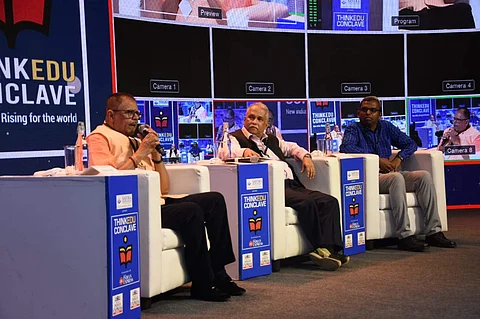

"The New Education Policy (NEP) 2020 is not a policy of a particular political government but it is a policy of the people," remarked Milind Marathe, former Assistant Professor, KJ Somaiya College of Engineering at the 12th edition of The New Indian Express's ThinkEdu Conclave 2023 in Chennai. Elaborating on the impact of technology on education, Prof Marathe said that about three crore students enrolled on the SWAYAM (Study Webs of Active-Learning for Young Aspiring Minds) platform only for online courses.
While noting the positive impact of NEP 2020 during the session titled Education, Technology and NEP 2020: What Lies Ahead, Prof Marathe also said that one must also "scream out the bad side of the policy". The NEP, among other provisions, had also envisioned the establishment of the National Educational Technology Forum (NETF). However, the body wasn't enhanced by updating it with the latest technology and skill set that students and faculty require, said Jayaprakash Gandhi, career consultant and analyst and also the chair for the session. "It is a very good provision from the student's point of view but I still think many institutions haven't realised the challenges they would face if NEP is implemented completely," he added.
Read Also : 10,000 medical students join Aahwan protest demanding postponement of NEET PG 2023 exam
Despite the uncertainties, an "online engagement" model would be possible in the next five to 10 years, said Dr Andrew Thangaraj, Professor, IIT Madras and National Coordinator for SWAYAM. "While 85 to 90 lakh children join educational institutions every year, a very small fraction of them go to Indian Institutes of Technology (IITs). There is a frustration in the admission process," he added. However, this situation can change by providing high-quality low-cost education.
The panelists also acknowledged the disparities that online education presents. "According to statistics from 2019, around 14 per cent of students in rural India have internet facilities. There is an issue of devices as well," said Prof Marathe. However, the twin aim should be penetration to rural areas on one hand and on the other hand, empower high-income aspirational groups as well, he said.
Similar views were aired by Dr Thangaraj. "Online education has its limitations. But IITs have come together and run projects for 20 years that have benefited a lot of students," he said. He also added that a discussion regarding a "digital university" is in the works in the Ministry of Education, which might be introduced as a Bill in the Parliament.
